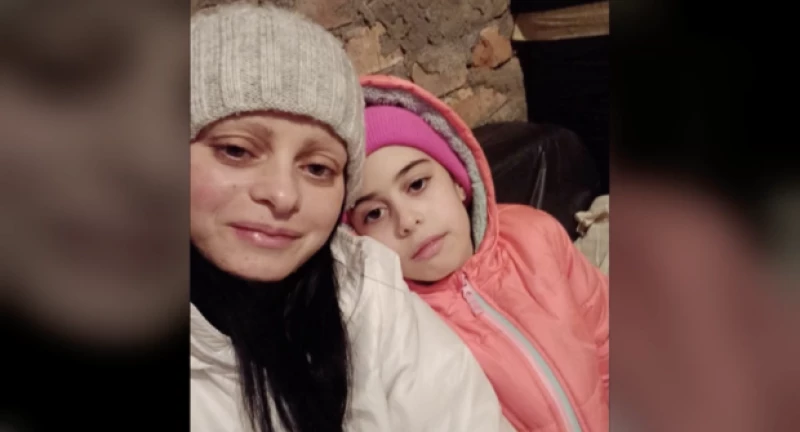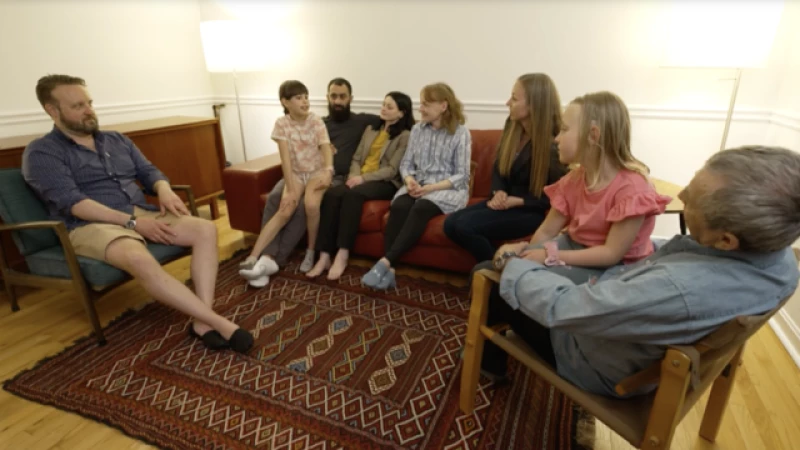Pennington, New Jersey — Yana, a 10-year-old fourth-grader from Ukraine with a bright smile and big dreams, said she has felt welcomed in New Jersey, calling the U.S. "very, very, very nice."
"I like the flowers here," Yana said in English, which she has learned remarkably quickly. "People aren't, like, being mean to anybody. They're being nice to everybody."
Asked if she feels safe in America, Yana said, "Yeah."
Roughly two years ago, Yana and her family had their lives suddenly upended by Russia's invasion of their native country. Olena Kopchak, Yana's mother, remembers the very moment their neighborhood in the port city of Mykolaiv was shelled by the Russian military.
"We heard powerful explosions," Kopchak said in her native tongue. "We could not believe it at the beginning … our house was literally moving. It started to shake. We thought it was the end."
Russia's invasion in February 2022 displaced millions of refugees, most of them women and children, triggering the largest refugee exodus in Europe since World War II. As other European countries like Poland and Germany absorbed these refugees, the U.S. quickly followed suit, with President Biden vowing to welcome 100,000 Ukrainians.
In April 2022, a groundbreaking initiative called "Uniting for Ukraine" was established by the current administration, allowing Ukrainians sponsored by Americans to work in the U.S. without the usual visa hurdles.
"I couldn't even sleep the night the program launched. I stayed up until midnight, eagerly waiting for the website to go live," shared Lana Rogers, a U.S. citizen residing in New Jersey and sister to Kopchak.
Rogers took advantage of the Uniting for Ukraine program to sponsor her sister and family, who successfully relocated to New Jersey in June 2022. Initially supported by Rogers and government assistance, Kopchak and her spouse have now secured employment and their own apartment in central New Jersey.

Over the past two years, U.S. immigration authorities have greenlit more than 236,000 cases through the Uniting for Ukraine initiative, as confirmed by the Department of Homeland Security. By the end of March, over 187,000 Ukrainians had entered the U.S. under this program.
An additional 350,000 Ukrainians have sought refuge in the U.S. following the Russian invasion, primarily on temporary visas rather than through sponsorship, according to DHS.
"The Department has fulfilled President Biden's promise to welcome Ukrainians escaping Russia's calculated and unjustified war on Ukraine," stated Homeland Security Secretary Alejandro Mayorkas.
Contrary to the usual U.S. immigration policies, the integration of tens of thousands of Ukrainian refugees into American communities has been remarkably efficient and relatively free of controversy.
While Republican-led states have taken legal action against nearly every major immigration policy of the Biden administration, such as a similar sponsorship program for migrants from Cuba, Haiti, Nicaragua, and Venezuela, the Uniting for Ukraine initiative has not faced any court challenges. In fact, some Republican lawmakers have voiced their support for welcoming Ukrainian refugees.
Although the influx of hundreds of thousands of migrants at the U.S.-Mexico border has strained resources in cities like New York City, Chicago, and Denver, the resettlement of Ukrainians has not sparked the same level of opposition, nor has it caused significant political issues for the Biden administration.
Unlike the program for Cubans, Haitians, Nicaraguans, and Venezuelans, which has a monthly cap of 30,000 approvals, the Uniting for Ukraine initiative does not have a numerical limit. Applications for the program are also processed relatively quickly, sometimes in a matter of weeks or even days — a rarity in the overburdened and understaffed U.S. immigration system.
Krish O'Mara Vignarajah, the president and CEO of the refugee resettlement organization Global Refuge, commented that Uniting for Ukraine "demonstrates how the U.S. can act swiftly when it chooses to do so."
In the United States, Ukrainian refugees have been met with a warm reception, partially due to geopolitics. They are viewed as victims of an anti-American government in Moscow, fostering a sense of solidarity between the American and Ukrainian people.
One factor contributing to the smooth transition of Ukrainian arrivals is the unique nature of Uniting for Ukraine. Those coming to the U.S. under this program require an American sponsor for financial assistance and are able to work legally upon arrival. Additionally, the first wave of Ukrainian refugees is eligible for refugee resettlement benefits like food stamps.
On the other hand, migrants arriving at the southern border face different challenges. They are unable to work legally until 180 days after requesting asylum and are generally not eligible for federal benefits. For example, Cubans, Haitians, Nicaraguans, and Venezuelans under a different sponsor policy must apply for a work permit before being able to work legally.
According to Vignarajah, race may also be a factor in the differential treatment of Ukrainian refugees compared to other immigrant groups. She noted that racism and xenophobia have influenced the unique reception of Ukrainians in the U.S.
Despite this, Ukrainians are encountering their own set of challenges. Their stay in the U.S. is permitted under a form of immigration authority called humanitarian parole, but it only lasts for two years at a time. Additionally, they do not have a clear path to obtaining permanent legal status or American citizenship.
Although the Biden administration has stated that most Ukrainians will likely return home once the conflict in their country is resolved, there is currently no indication that this will happen in the near future.
"I cannot go back," Kopchak expressed in English, highlighting the ongoing bombings in her hometown of Mykolaiv by the Russians. "I have no home. I have nothing."







